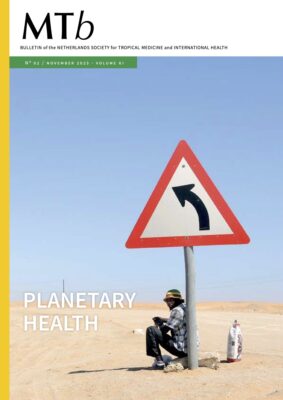
Planetary health
Editorial
Unloading the overload
“Although published in 1993, planetary overload could have been written yesterday. The statistics may be somewhat outdated but its message certainly is not. Could humans really become ‘an endangered species’?”
Readers of MTb may recognise the opening words of my review of McMichael’s Planetary Health book, published in the 2019 Climate Change and Health edition. [1, 2]
Unfortunately, thirty years later, McMichael’s exploration and analysis of the problems that continue to pose a threat to us and our ecosystems still stand, including “…the health risks and hazards from ozone destruction; the greenhouse related heatwaves and hurricanes; the indirect health consequences of climate change on food production and the spread of infections; the immune suppression by ultraviolet radiation; the erosion of overworked soils; depletion of freshwater, and loss of genetic and biological resources for producing food and medicines. Rapid urban growth poses other health hazards. Population health cannot be sustained without intact ecosystems”. This listing of climate emergencies could indeed have been written yesterday. Except for the first one: almost forty years ago, in 1985, the world came together to protect the ozone layer.[3] And it worked. Why for ozone and why not for the other domains? Perhaps they were not loud enough: the voices of the scientists, activists, and concerned citizens. Could it be that people only act when the floods reach their own doorsteps? The heatwaves and hurricanes have reached us, and worldwide people are now dealing with the many faces of climate change affecting livelihood, health, food production, and more. So, although we were warned we decided not to listen and act. Why didn’t we? Scientific proof was contested or simply disregarded; whistles were blown but not heard. Or could it be that the power of industry and politicians, and our belief in the gospel of ‘growth’ were simply too strong, allowing us to become ‘comfortably numb’? Not all is bleak though. Encouraging are the actions of civil society – like the massive protest last November the 12th, when tens of thousands of people marched the Amsterdam streets in support of climate justice; the ‘biggest ever’ protest in recent years. Increasingly, there is more clout for renewable energy and sustainable food production, for green acting and thinking. We finally have come to realise that our actions locally really have global consequences, and that growth for some comes with a cost for many. Shaping the future of equitable and sustainable planetary health is the title of the upcoming ECTMIH2023 Congress. We invited the NVTG Working Parties to reflect on how, for them, the principles of climate justice, human rights and equitable, sustainable global health translate into concrete actions in the field they are working in. As you can read, they did not look for the magic bullet or a technical (quick) fix to address present-day global health challenges. If we’ve learned anything, it’s that quick fixes often fail to address underlying problems, and seldom offer sustainable and satisfactory solutions to complex problems.
Esther Jurgens, estherjurgens@xs4all.nl




















































